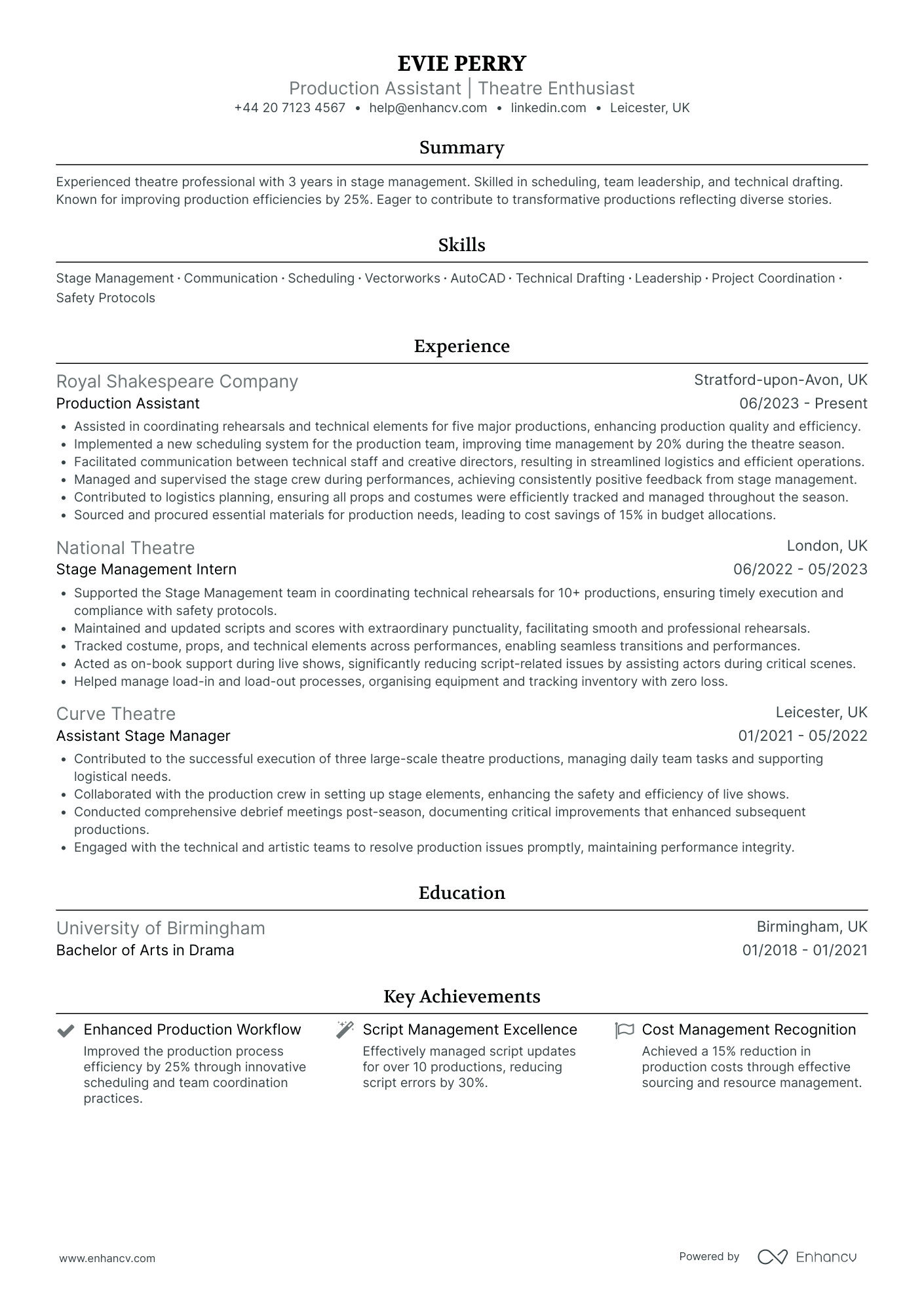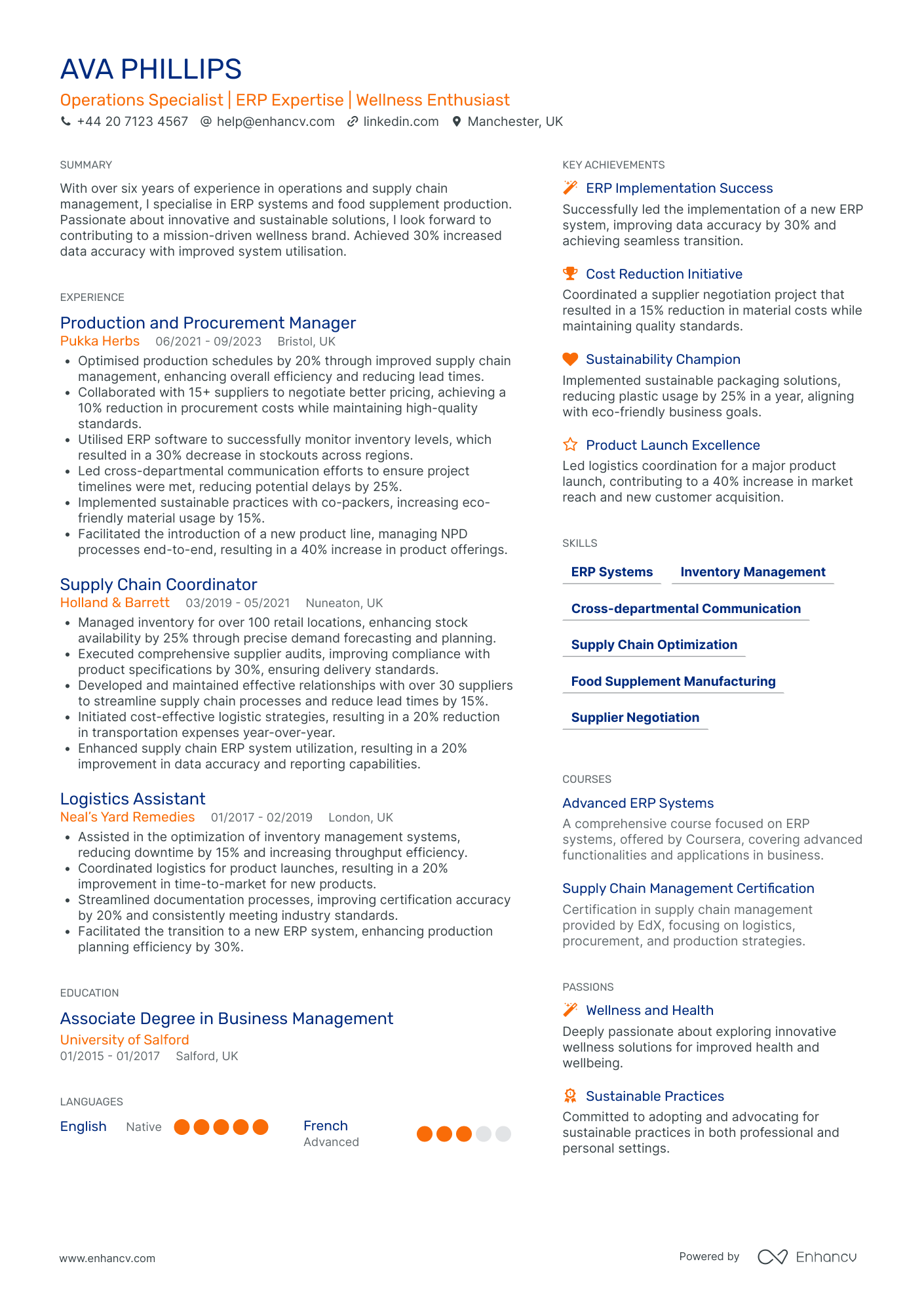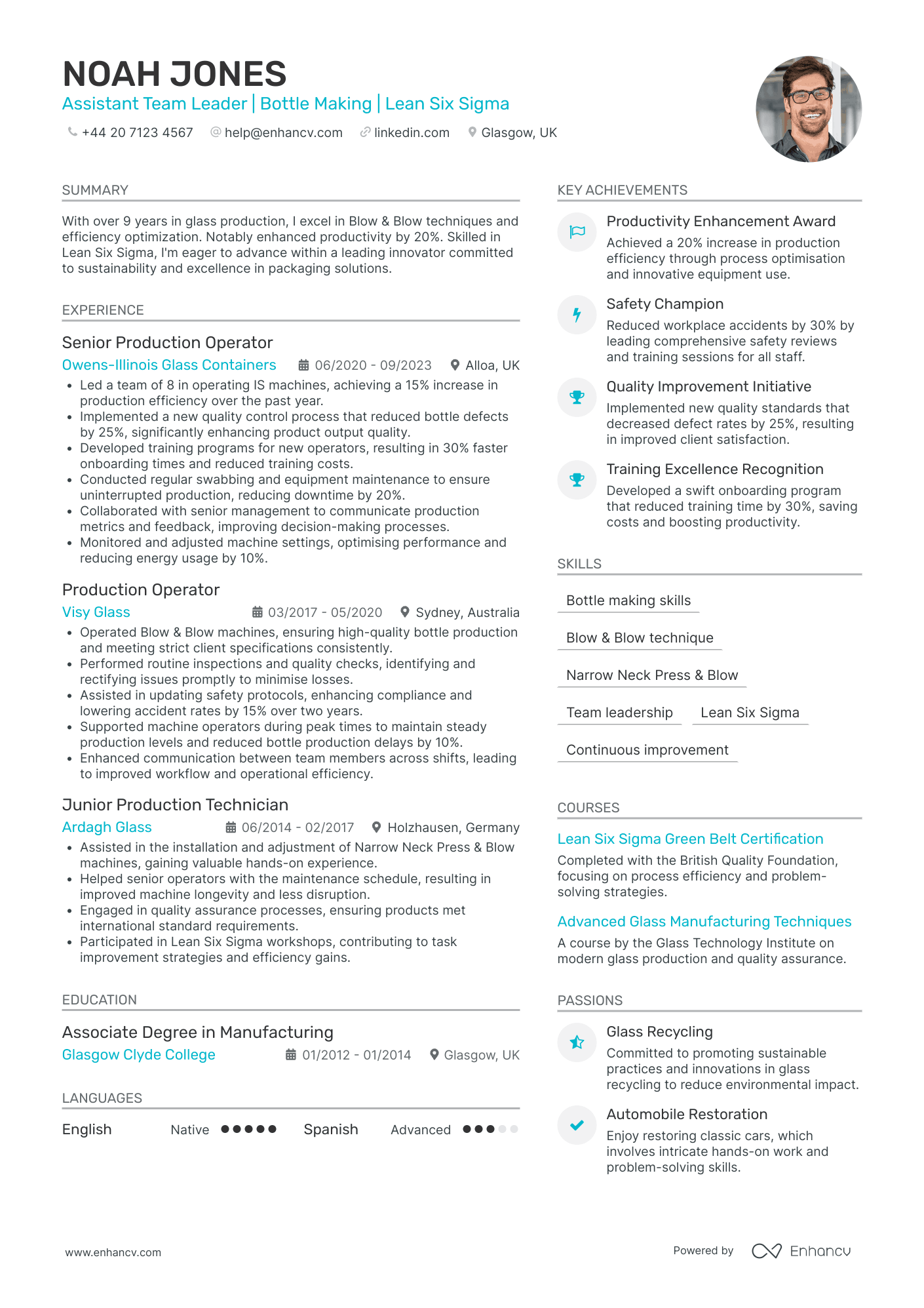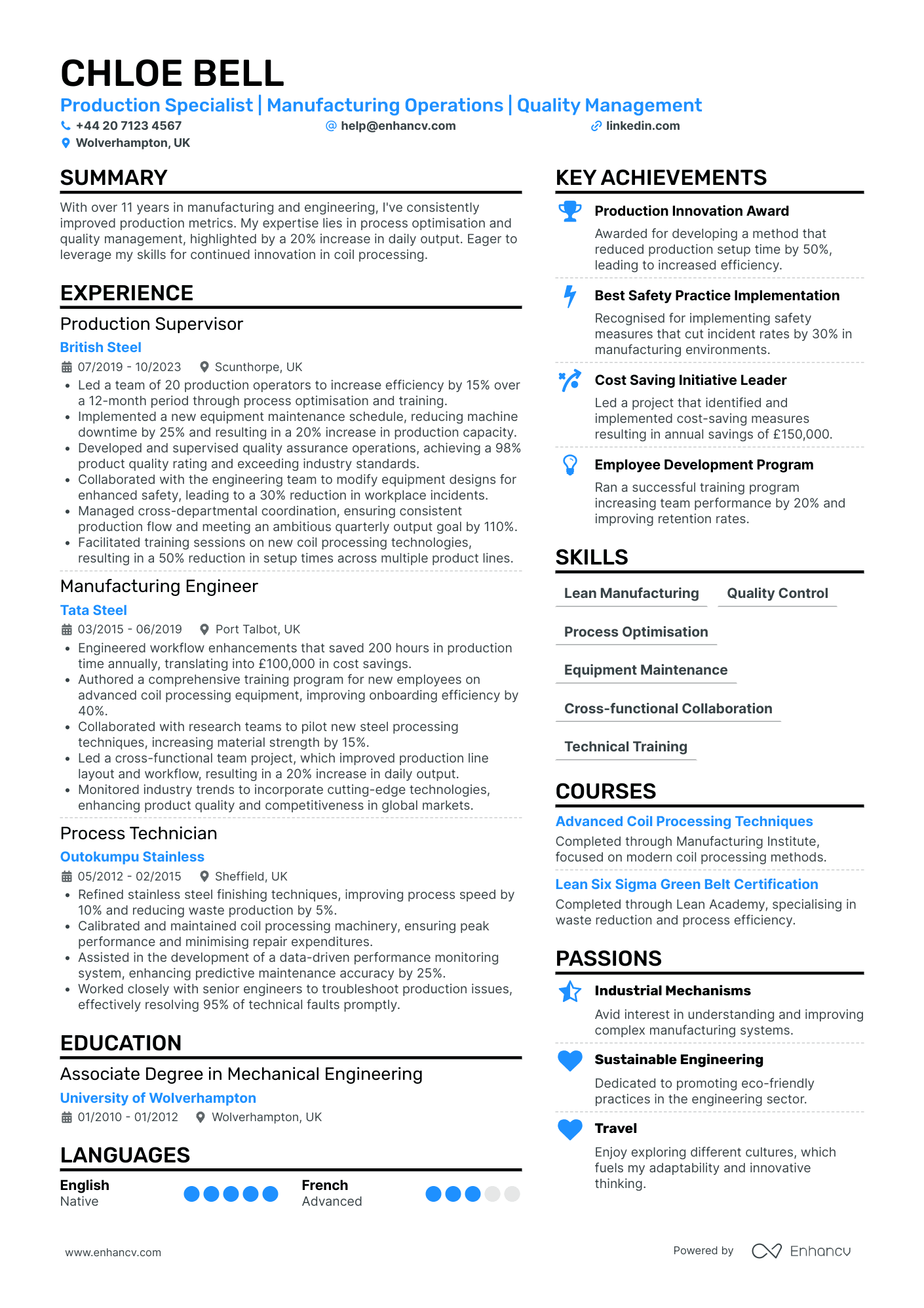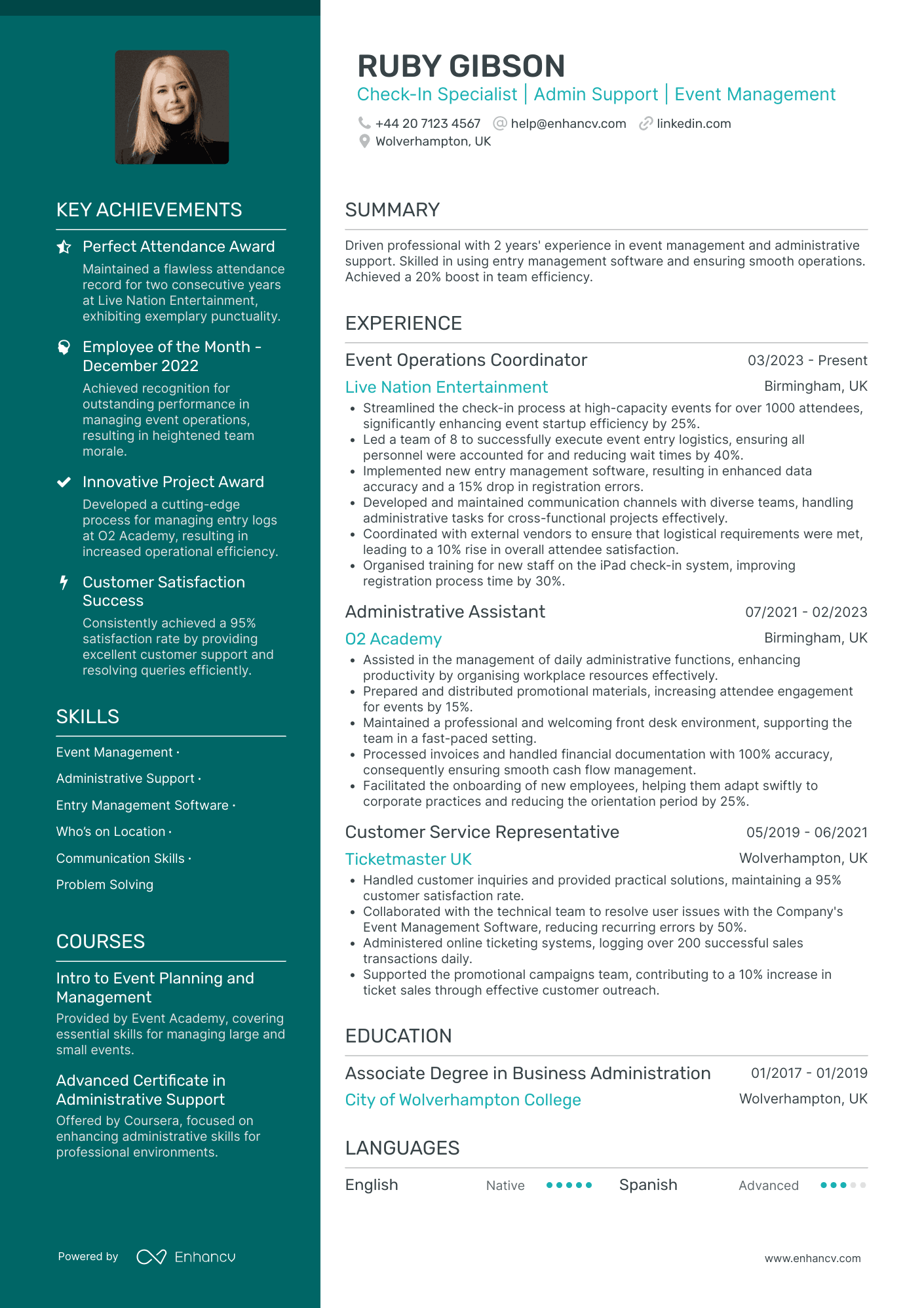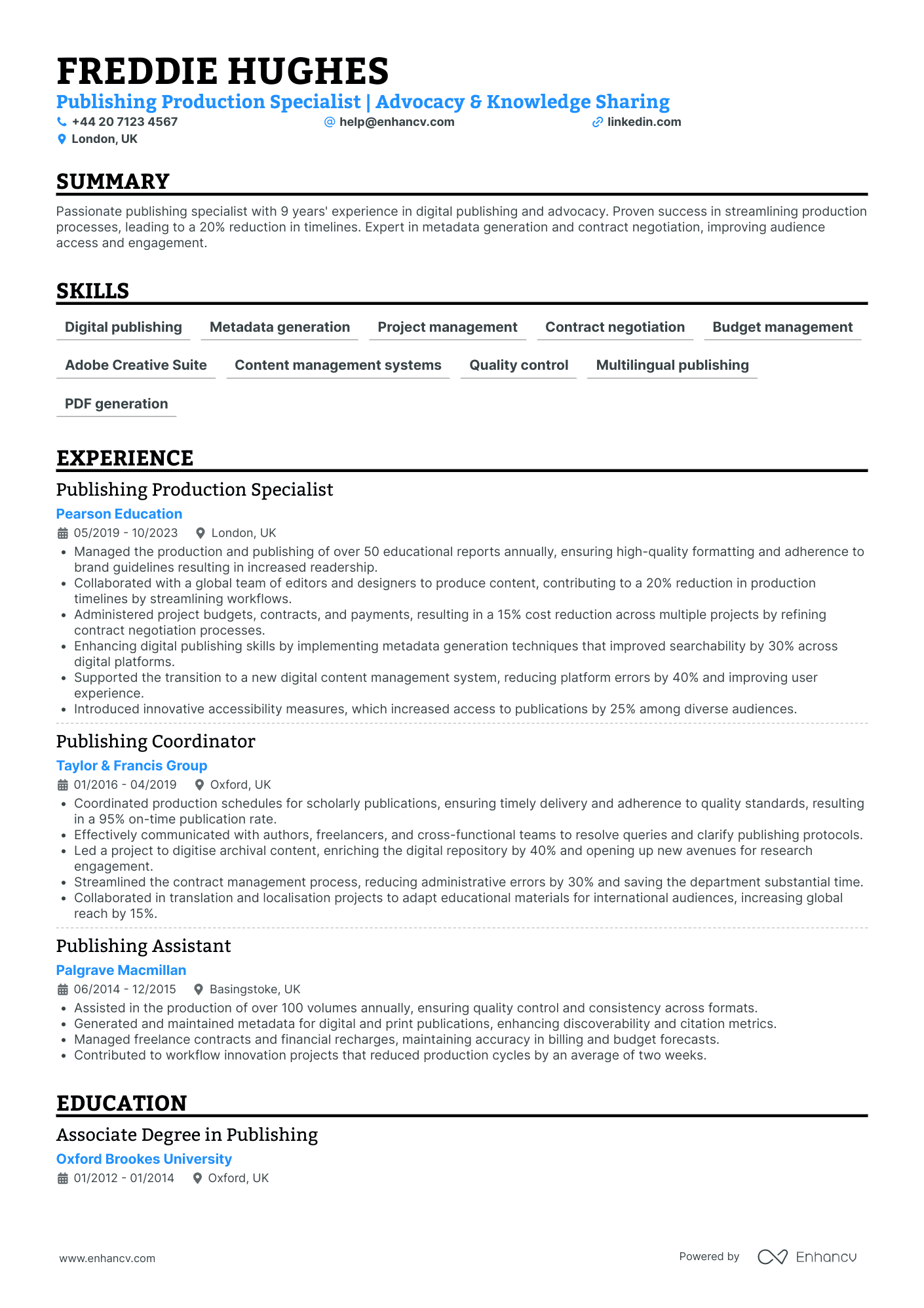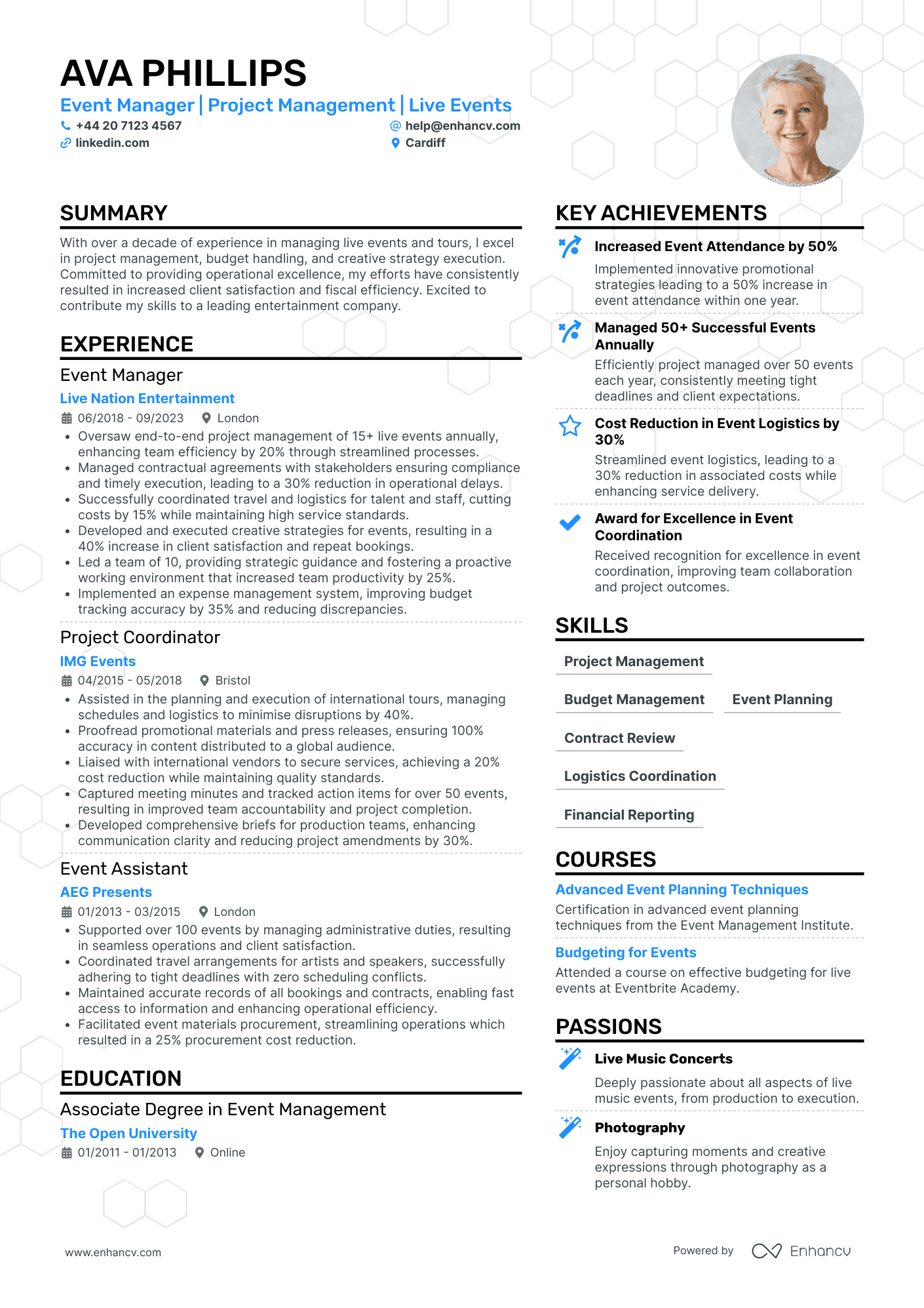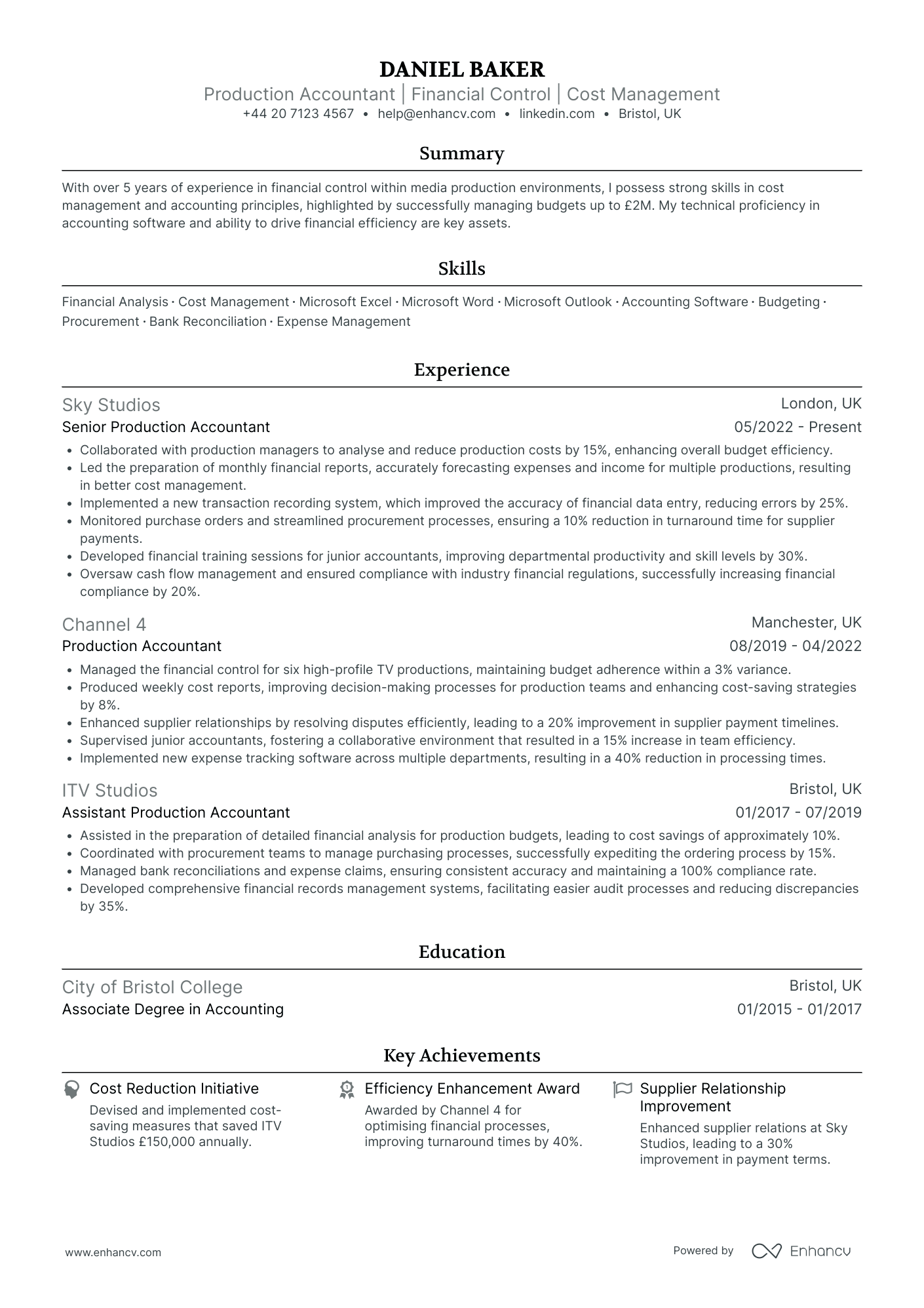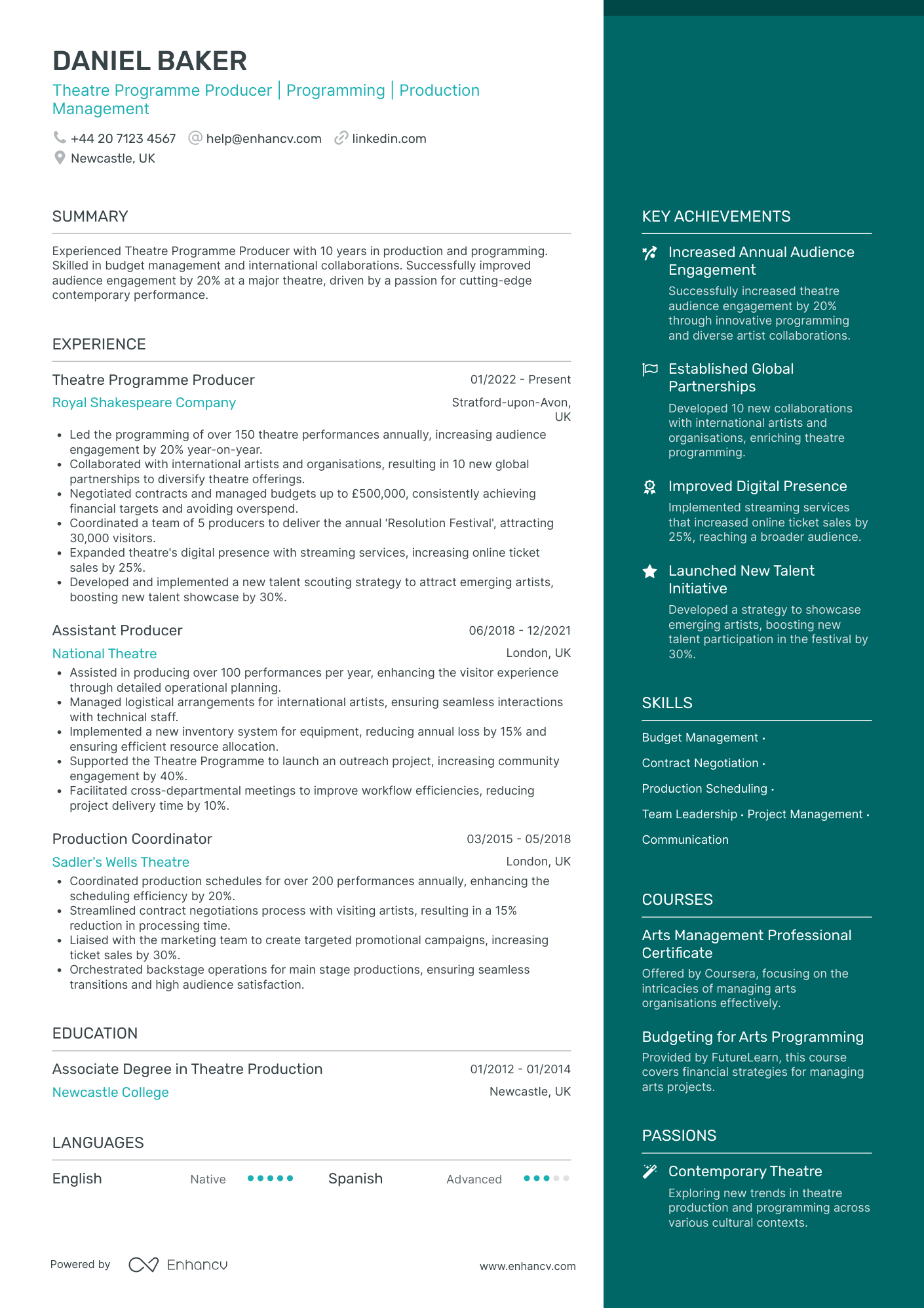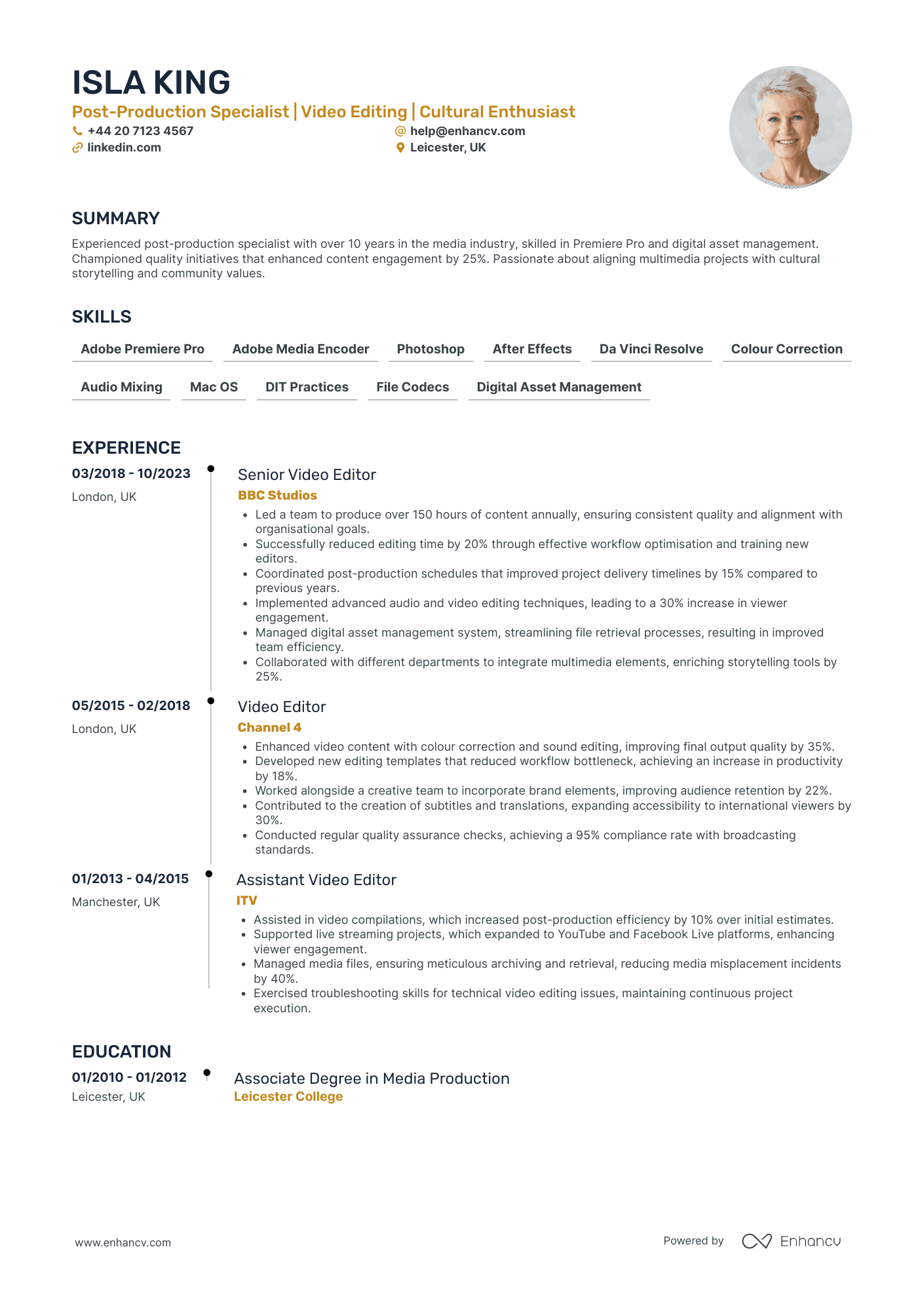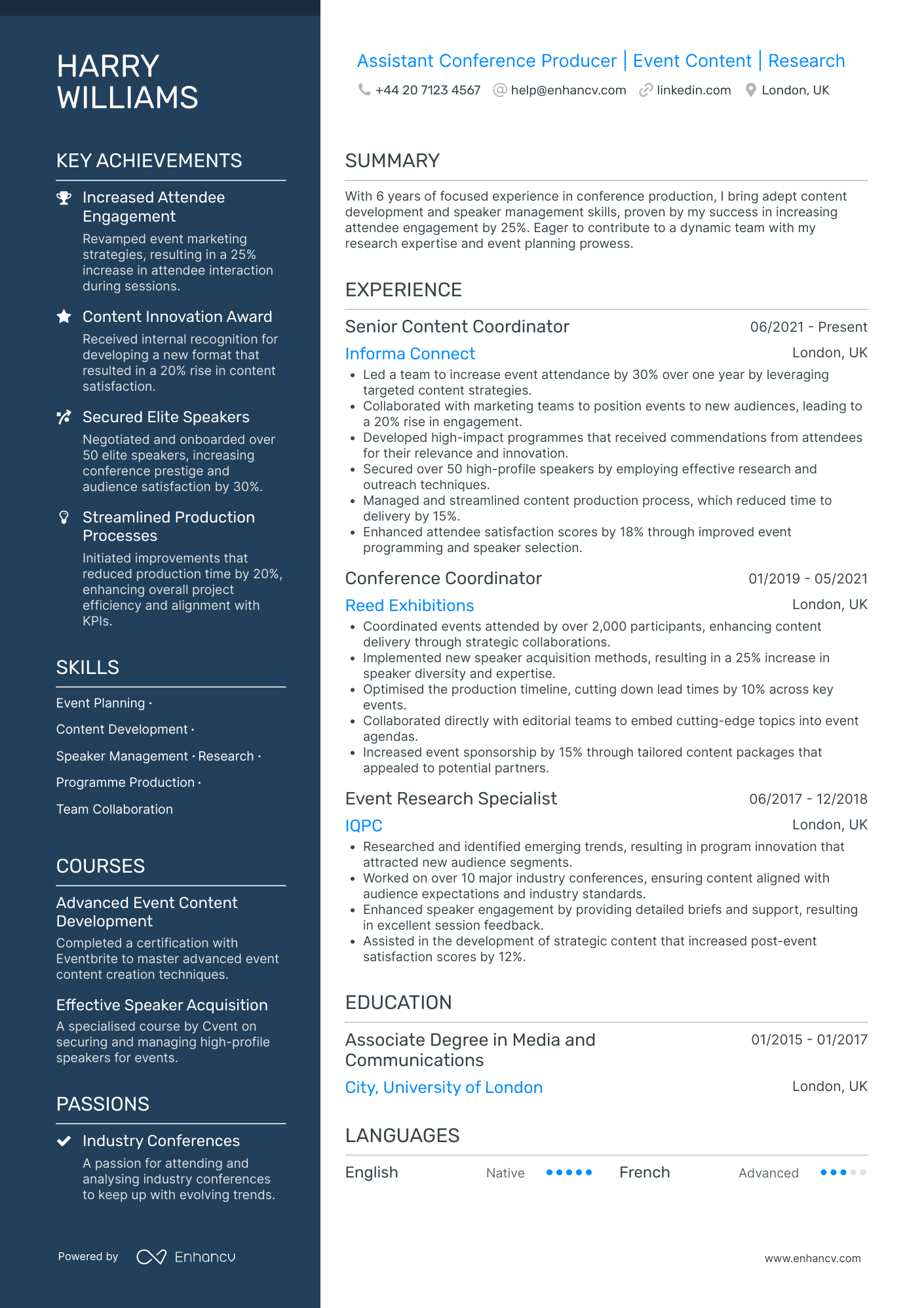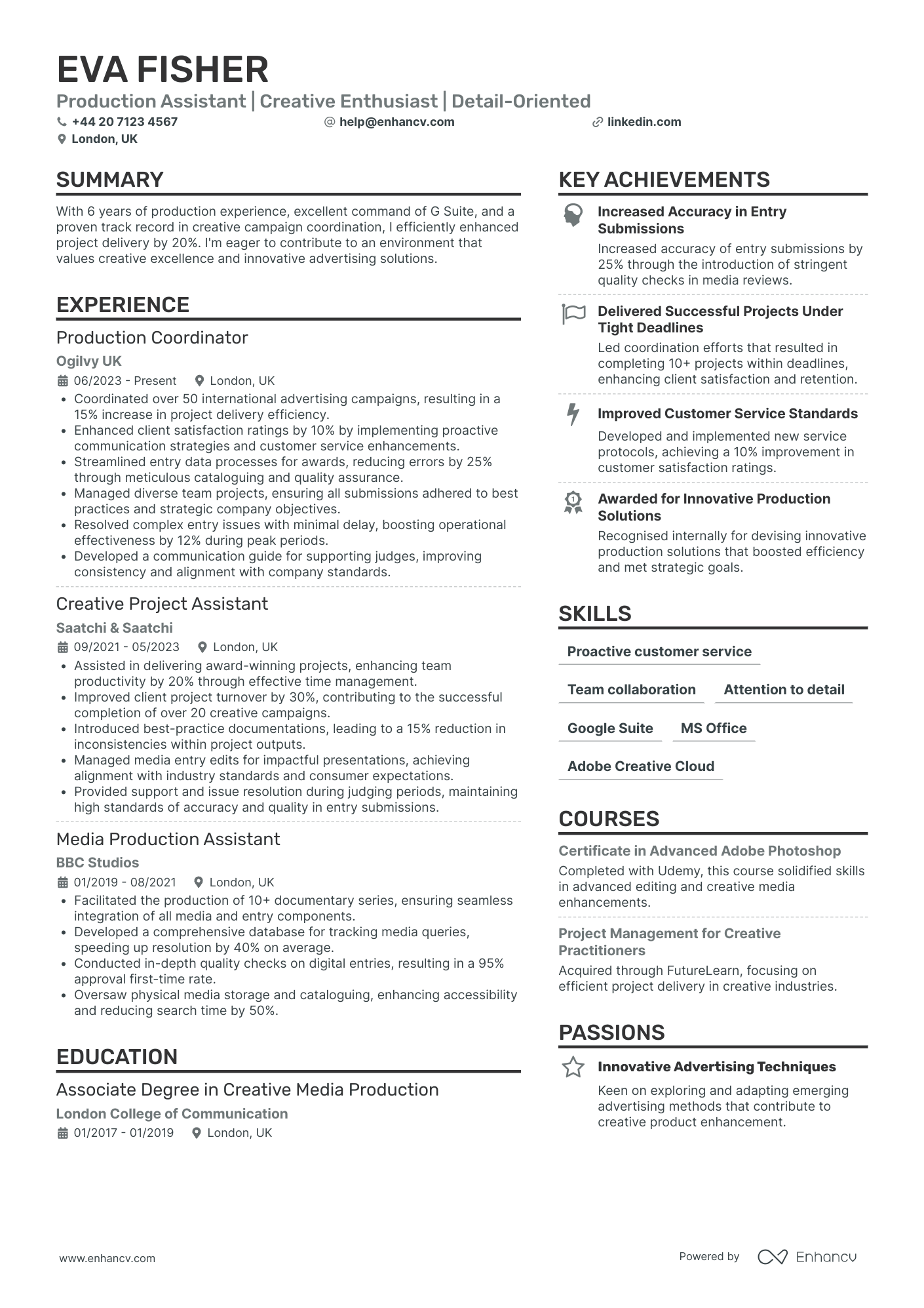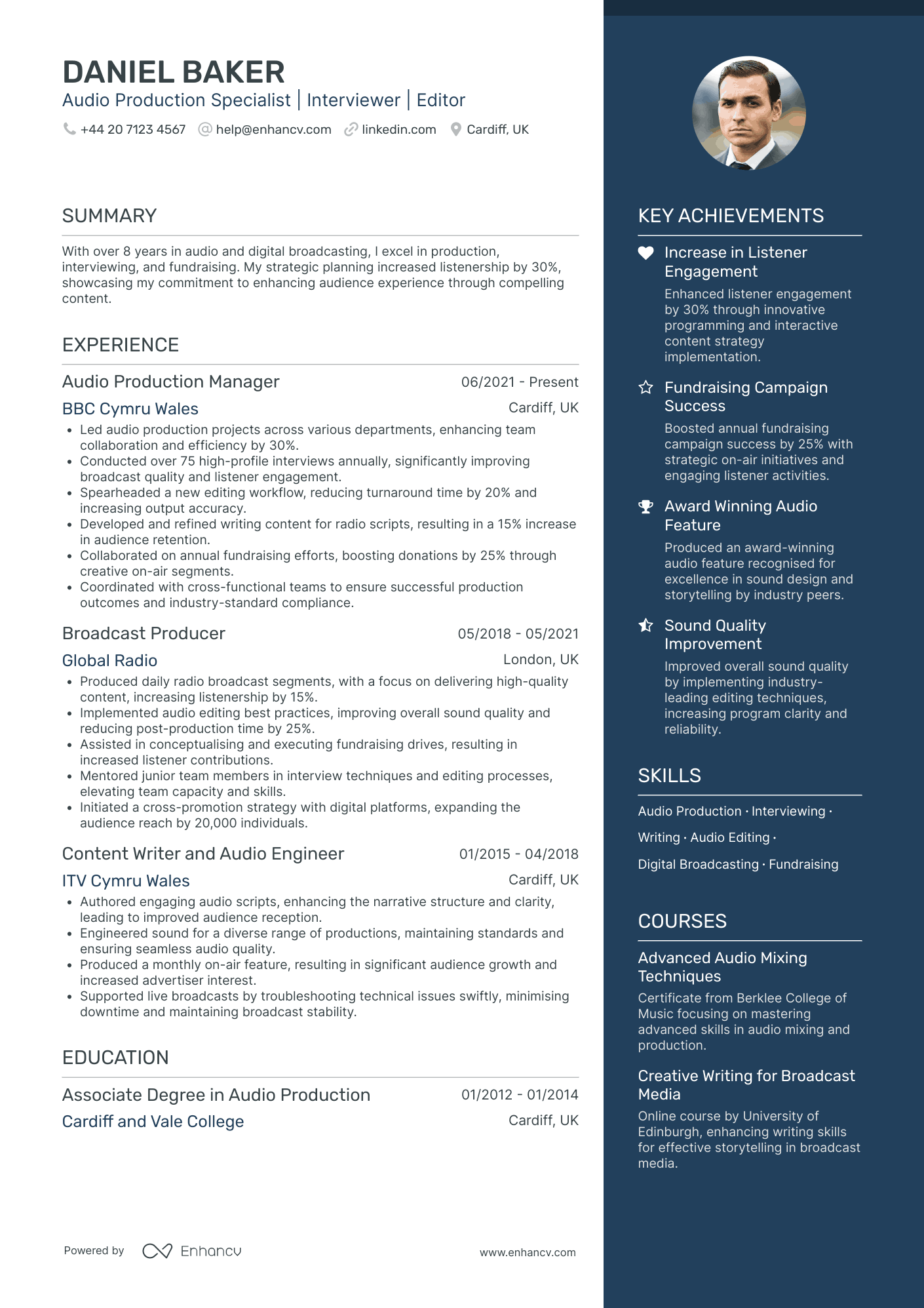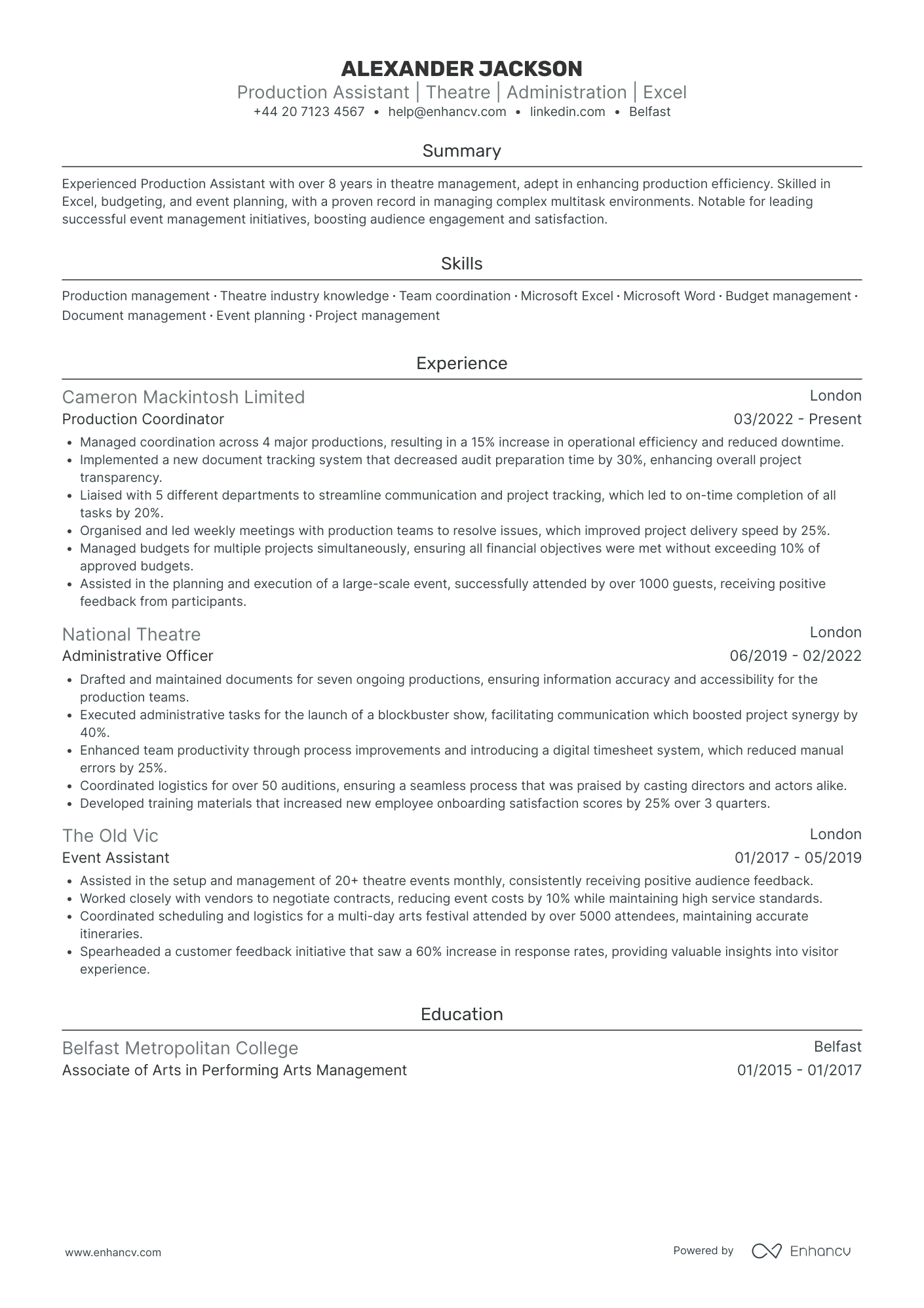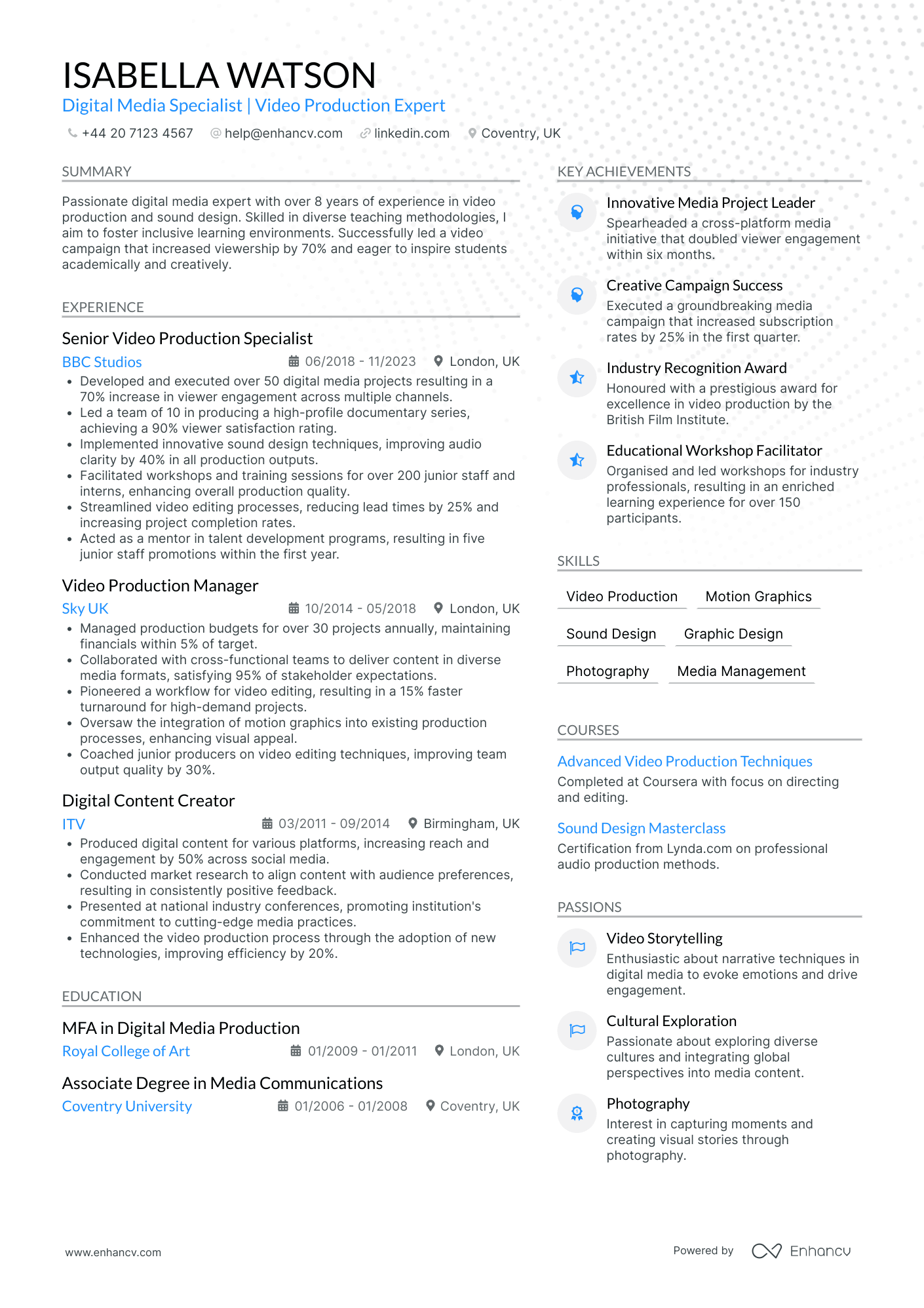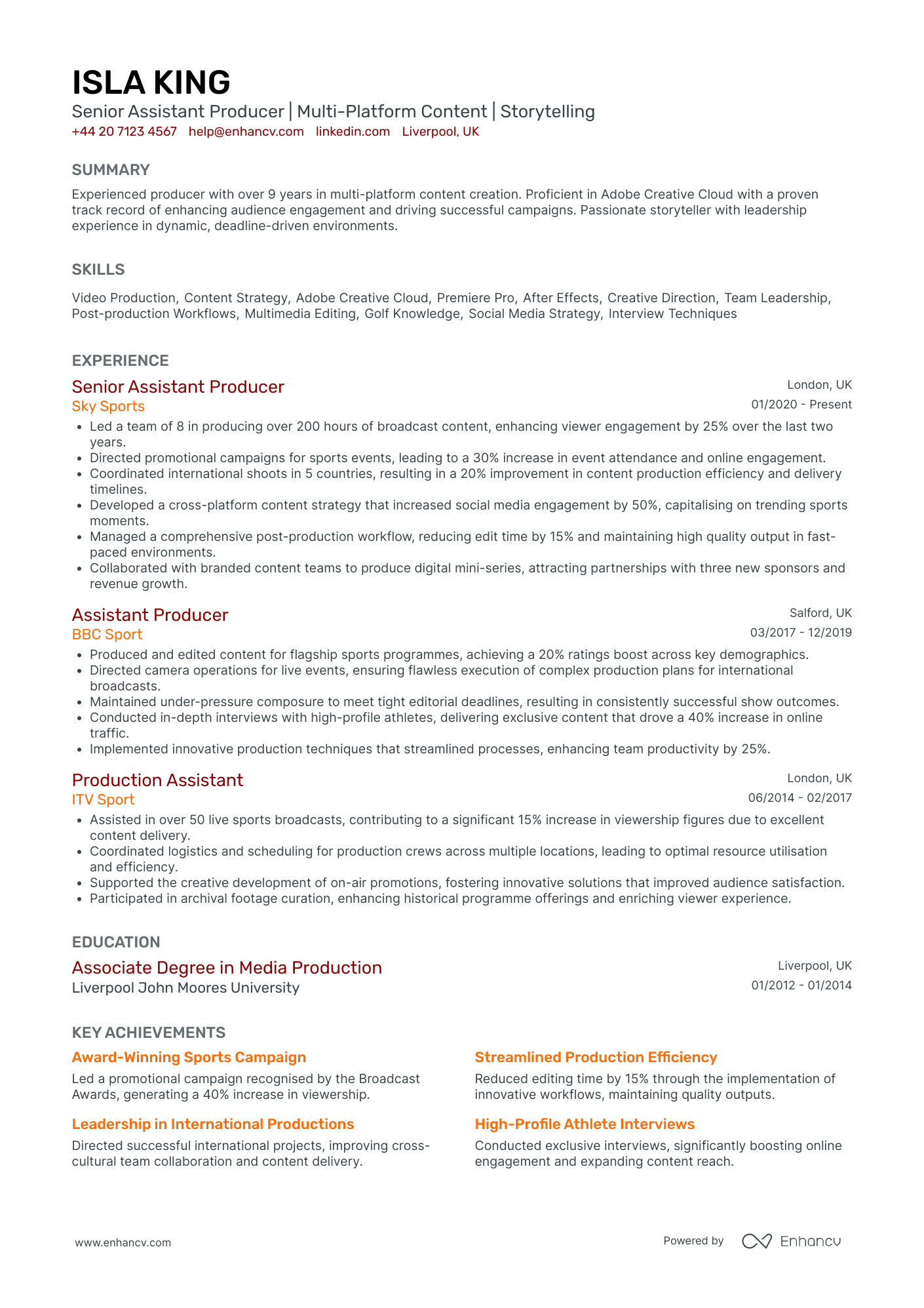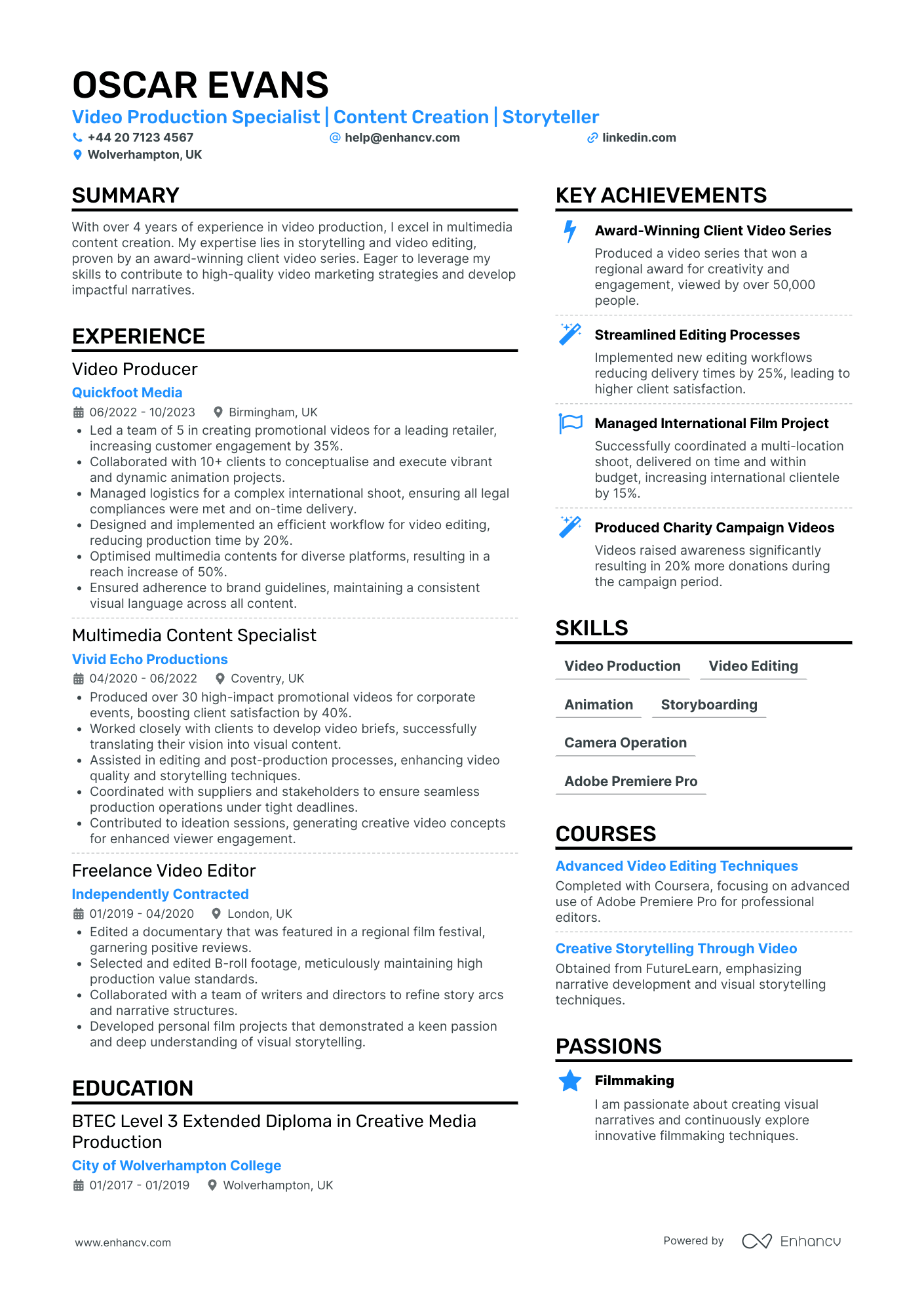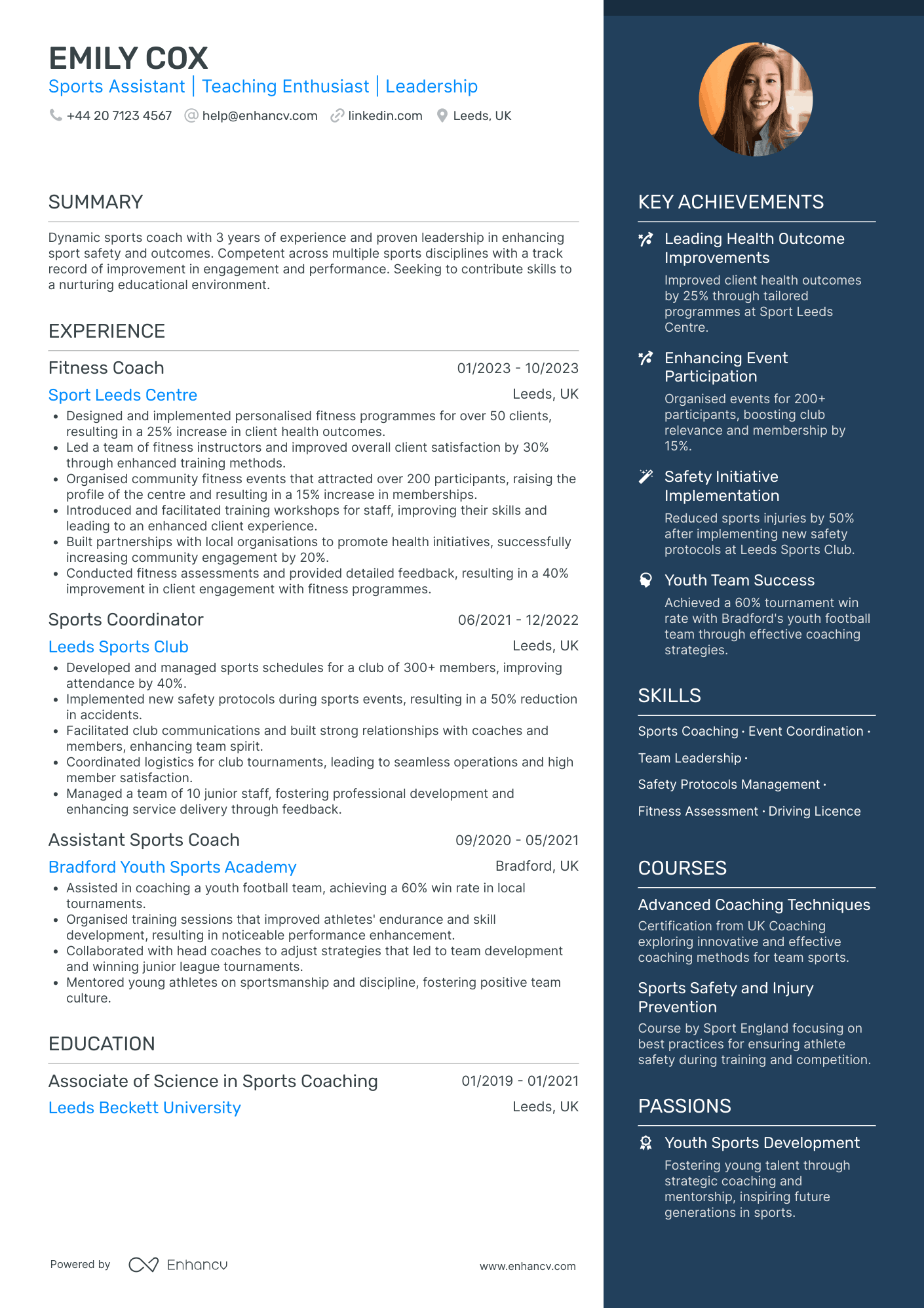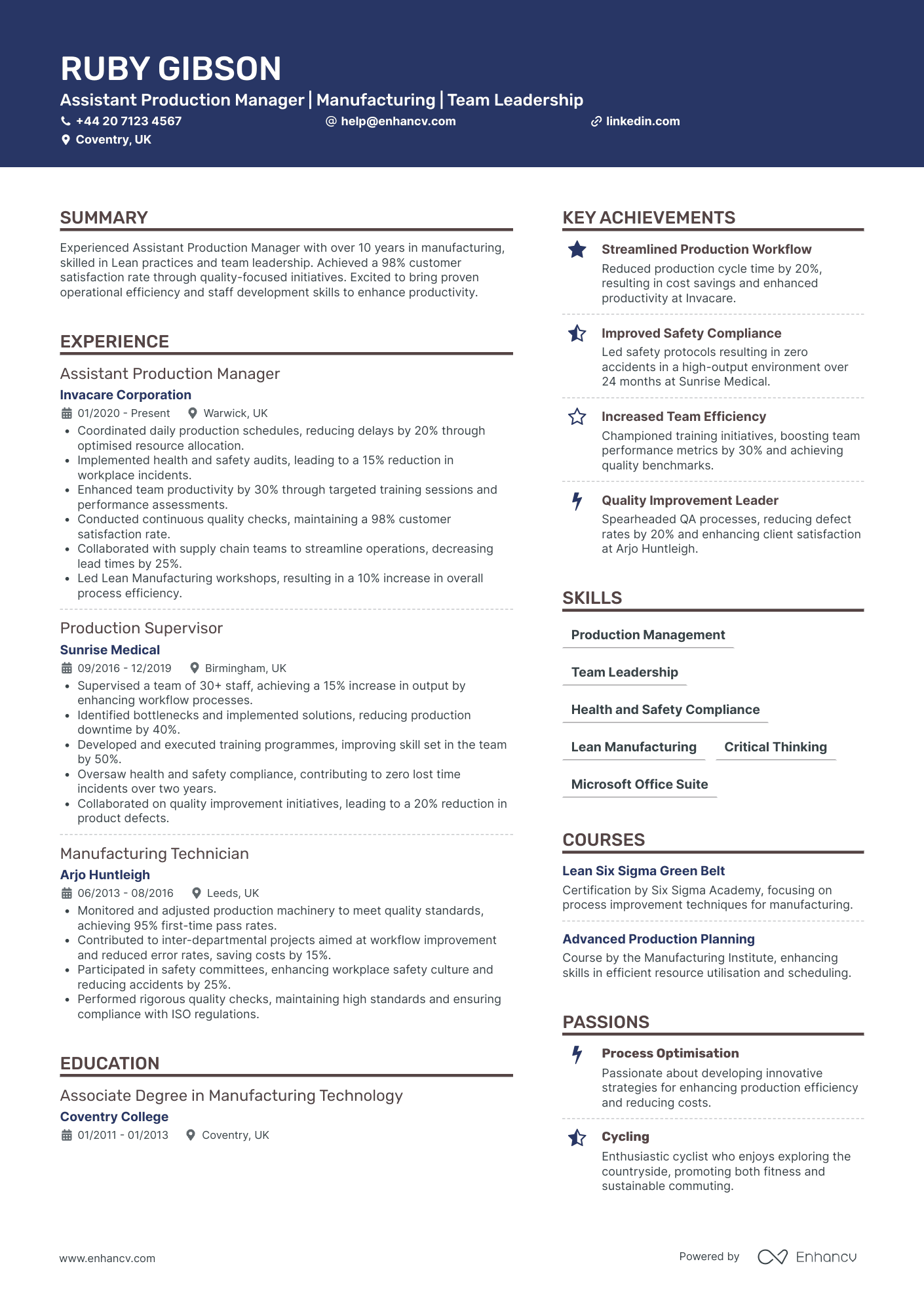Crafting a CV that effectively showcases your multi-faceted experience and relevant skills can be a significant challenge for a production assistant. Our comprehensive guide will provide you with tailored strategies and examples to elevate your CV, ensuring you present a compelling case to potential employers.
- Applying best practices from real-world examples to ensure your profile always meets recruiters' expectations;
- What to include in your work experience section, apart from your past roles and responsibilities?
- Why are both hard and soft skills important for your application?
- How do you need to format your CV to pass the Applicant Tracker Software (ATS) assessment?
If you're writing your CV for a niche production assistant role, make sure to get some inspiration from professionals:
Resume examples for production assistant
By Experience
Junior Production Assistant
- Clear Structure and Organization - The CV is organized with distinct sections such as experience, education, skills, and achievements, all concisely laid out. This structured presentation aids in immediately locating crucial information, presenting Evie's background and competencies effectively to the reader.
- Progressive Career Development - Evie's career trajectory shows significant growth, starting as an Assistant Stage Manager, then advancing to a Stage Management Intern at a prestigious theater, and finally taking on the role of Production Assistant with the Royal Shakespeare Company. This progression underscores a successful career path in the competitive theatre industry.
- Emphasis on Technical Proficiency and Leadership - The CV highlights key industry-specific tools like Vectorworks and AutoCAD, indicating technical depth in stage management. Furthermore, achievements such as leading a stage crew and implementing a new scheduling system showcase Evie's leadership capabilities and proactive contribution to theatre production.
Senior Production Assistant
- Career Progression and Industry Expertise - Ava Phillips demonstrates a well-defined career trajectory, evolving from a Logistics Assistant role to a Production and Procurement Manager within six years. This progression highlights her steady growth and competence in the supply chain and production domain, particularly within the health and wellness industry. Her ability to transition smoothly into more complex roles at reputable companies like Pukka Herbs and Holland & Barrett signals strong industry-specific expertise.
- Innovative Use of ERP and Sustainability Initiatives - The CV underscores Ava's robust knowledge and skill in using ERP systems to streamline operations, a vital tool in contemporary supply chain management. Her proficiency in implementing and optimizing these systems is augmented by her commitment to sustainability, evidenced by her achievements in eco-friendly practices and materials management. This unique blend of technical and sustainable initiatives makes her a valuable asset in industries focused on efficiency and eco-consciousness.
- Cross-functional Leadership and Communication - Ava's track record is marked by effective cross-departmental communication and leadership abilities. Her experience in leading initiatives that reduce project delays and enhance supplier negotiations reflects a strong ability to coordinate across various business functions. These soft skills are crucial for ensuring cohesive team collaboration and project success, showcasing her as a leader capable of driving organizational improvements and fostering team synergy.
Lead Production Assistant
- Clear Structure and Conciseness - The CV is presented with a clear and organized structure, making it easy to navigate through the candidate's qualifications. Each section is well-defined, with concise bullet points that effectively summarize key achievements and responsibilities without overwhelming detail.
- Demonstrates Strong Career Growth - The career trajectory illustrates a clear path of advancement from a Junior Production Technician to an Assistant Team Leader. This progression, coupled with roles in different global locations, highlights both professional growth and adaptability within the glass manufacturing industry.
- In-Depth Industry Knowledge - The CV showcases strong industry-specific competencies, such as expertise in Blow & Blow techniques and IS machine operations. The candidate’s hands-on experience with modern glass production technologies and Lean Six Sigma methodologies further positions them as a technically proficient leader in the field.
Entry-Level Production Assistant
- Logical and Structured Presentation - The CV is well-organized, with each section clearly delineated to enhance readability. The use of bullet points in the experience section allows for easy digestion of accomplishments and responsibilities, making it simple to quickly grasp the candidate's qualifications and impact in previous roles.
- Progressive Career Trajectory - Chloe Bell’s career path shows a logical progression from Process Technician to Production Supervisor. Each role she held increased in responsibility, showcasing her professional growth and dedication to advancing within the manufacturing industry. The transition from technical roles to leadership positions highlights her ability to not only master technical skills but also lead teams effectively.
- Industry-Specific Expertise - The CV highlights unique industry-specific skills and certifications, such as Lean Six Sigma Green Belt and advanced coil processing techniques. These qualifications underscore Chloe’s technical depth and commitment to staying updated with the latest manufacturing methodologies, ensuring she adds modern value to any production environment.
Experienced Production Assistant
- Structured presentation with clear progression - The CV is well-organized with distinct sections that highlight key aspects like experience, education, and skills concisely. The chronological order of roles illustrates clear career advancement, making it easy to follow and understand the candidate's professional growth.
- Progressive career development in event management - Ruby's career trajectory shows a significant shift from customer service to event management and administration, with her current role as an Event Operations Coordinator reflecting her advancement. This progression suggests a strong adaptability to dynamic job roles within related sectors.
- Significant achievements impacting business processes - Throughout her roles, Ruby's accomplishments have led to measurable improvements in efficiency and customer satisfaction. Implementation of new software, streamlined processes, and reduced wait times are mentioned with quantifiable outcomes, indicating her ability to drive impactful changes.
Freelance Production Assistant
- Content presentation and clarity - The CV is well-structured, presenting a clear and concise overview of Freddie Hughes' career. It effectively utilizes sections such as Experience, Skills, Education, and Achievements that are easy to navigate and understand, showcasing the candidate's qualifications in an organized manner.
- Career trajectory and growth - Freddie Hughes demonstrates a progressive career path, moving from a Publishing Assistant role at Palgrave Macmillan to a Publishing Production Specialist at Pearson Education. This advancement reflects a significant growth in responsibilities and expertise, highlighting an upward trajectory within the publishing industry.
- Achievements and business relevance - The CV details numerous achievements with measurable impacts, such as a 20% reduction in production timelines and a 15% cost reduction across projects. These accomplishments not only illustrate Freddie's ability to implement effective strategies but also showcase the candidate's contribution to increasing efficiency and reducing costs within organizations.
By Role
Television Production Assistant
- Logical Structure and Conciseness - The CV is well-organized, with each section clearly delineated and easy to navigate. It efficiently conveys information using bullet points, ensuring that key achievements and responsibilities are immediately apparent without unnecessary embellishment. This structure guarantees readability and direct access to critical information, which is essential for busy recruiters.
- Progressive Career Development - Ava Phillips exhibits a compelling upward career trajectory, advancing from an Event Assistant role to an Event Manager. This progression reflects increased responsibilities and skills acquisition over time. Ava's career reflects a steady advancement in the event management industry, showcasing her growing expertise and leadership capabilities.
- Focus on Operational Improvement - The CV emphasizes substantial achievements in optimizing processes within the event management industry. It highlights Ava's ability to implement systems like expense management and logistics coordination, leading to cost reductions and efficiency gains. These achievements not only demonstrate industry-specific skills but also underscore her impact on business performance through strategic improvements.
News Production Assistant
- Impressive Career Progression - Daniel’s career trajectory showcases a steady rise through the ranks in the media financial control industry. Starting as an Assistant Production Accountant at ITV Studios, he progressed to Senior Production Accountant at Sky Studios. This growth reflects his expanding responsibilities and expertise in handling larger budgets and more complex financial scenarios.
- Industry-Specific Financial Acumen - The CV effectively highlights Daniel's specialized knowledge of financial management within the media production industry. His experience with advanced accounting software and cost management strategies, tailored to support media productions, showcases his deep understanding of industry-specific financial dynamics and challenges.
- Significant Business Impact Through Achievements - Daniel's professional accomplishments are presented with emphasis on the business impact, illustrating his value beyond mere financial accuracy. Initiatives like cost-saving measures that yielded £150,000 in savings annually, and efficiency improvements recognized by awards, underline his capability to significantly influence the financial performance of media companies.
Theatre Production Assistant
- Effective structuring to maximize readability - The CV utilizes clear headings and bullet points, ensuring key information is accessible at a glance. The structured layout guides the reader through each section smoothly, highlighting the candidate's competencies and achievements without overwhelming detail.
- Dynamic career progression in tech - Evident growth is observed throughout the CV, with the candidate advancing from junior roles to leadership positions in software development. This trajectory not only illustrates their technical acumen but also their capacity to manage and mentor teams in the fast-moving tech industry.
- Industry-specific technical prowess - The CV stands out through its emphasis on proficiency with advanced tools such as Docker, Kubernetes, and AWS. These elements, combined with certifications in cloud computing, underscore the candidate's technical depth and relevance in modern software development environments.
Music Video Production Assistant
- Content presentation and structure - The CV is well-organized with clear sections that are easy to navigate. It starts with a professional header, followed by a concise yet detailed career summary, which primes the reader on Isla's expertise in post-production. The experience section neatly outlines roles in reverse chronological order, each with specific accomplishments that strongly align with the overall career narrative.
- Career trajectory and growth - Isla King's career advancement is evident, progressing from an Assistant Video Editor to a Senior Video Editor at notable organizations like ITV, Channel 4, and BBC Studios. This trajectory highlights her capacity for leadership and increasingly complex responsibilities, including managing teams and optimizing workflows, underlining her substantial professional development over the years.
- Achievements and their business impact - The CV effectively translates professional achievements into business outcomes, not merely listing responsibilities but emphasizing impact. From improving viewer engagement by 30% to reducing project delivery timelines by 15%, these accomplishments demonstrate Isla's tangible contributions to organizational success, enhancing the relevance and appeal of her profile to potential employers.
Event Production Assistant
- Clarity and Structure in Content Presentation - The CV is structured in a way that segments the candidate's qualifications, experience, and skills into clear sections. Each section is well-labeled, allowing the reader to easily navigate through the candidate's achievements and qualifications. The bullet points within each role highlight key responsibilities and successes succinctly, making it easy to understand the impact the candidate has made.
- Progressive Career Trajectory - Harry Williams's career path demonstrates growth within the conference production industry. Starting as an Event Research Specialist and progressing to Senior Content Coordinator, the candidate has gained increasingly responsible roles, evidencing a clear dedication to their field. This shows not only expertise in their current role but also potential for future development.
- Industry-Specific Skills and Tools - The CV highlights particular skills and tools relevant to conference production, such as expertise in CRM Software and Eventbrite. Additionally, the candidate's ability to develop high-impact programmes and implement effective speaker acquisition techniques reflects a deep understanding of industry methodologies and technologies crucial for success in event content and research.
Advertising Production Assistant
- Structured and Concise Presentation - The CV is organized with clearly defined sections that allow for easy navigation through Eva's professional background. This clarity is complemented by concise points, especially in the experience section, where each bullet succinctly captures role responsibilities and achievements.
- Career Progression in Production - Eva's career trajectory demonstrates a natural progression within the production sector, advancing from a Media Production Assistant at BBC Studios to leading projects as a Production Coordinator at Ogilvy UK. This growth highlights an ability to take on increased responsibility and tackle more complex challenges over time.
- Emphasis on Executive Problem-Solving and Customer Service - Throughout her roles, Eva has consistently prioritized problem-solving and client satisfaction. Her achievements detail improvements in project delivery timelines, client turnover, and even the development of new service protocols that enhanced customer satisfaction by 10%.
Radio Production Assistant
- Structured and Concise Presentation - The CV is visually structured with clear headers, bullet points, and sections that make navigation easy. Each experience section begins with brief descriptions followed by bullet points, highlighting key duties and achievements concisely, aiding in a quick and efficient review.
- Strong Career Progression - The career trajectory demonstrates consistent growth, moving from a Content Writer and Audio Engineer to a Broadcast Producer, and then to an Audio Production Manager. This progression highlights Daniel's growing expertise and increasing responsibility within the broadcasting field.
- Achievements with Business Impact - The CV notably includes quantitative achievements that align with business objectives, such as increasing team efficiency by 30% and boosting donations by 25%. These details illustrate not only Daniel's technical skill but also his contribution to organizational success and goal attainment.
Fashion Production Assistant
- Structured and Well-Organized Content - The CV is methodically structured, starting with personal details, moving through experience, education, and additional skills, which makes it easy for hiring managers to quickly grasp crucial information. Each section is distinct and clearly labeled, ensuring that the document is readable and concise.
- Clear Career Advancement - Alexander Jackson's career trajectory displays a clear path of growth, moving from an Event Assistant to a Production Coordinator role, indicating increased responsibilities and trust within renowned organizations such as The Old Vic and Cameron Mackintosh Limited. This progression showcases a successful climb within the competitive theatre industry.
- Emphasis on Soft Skills and Leadership - The CV underlines strong soft skills, including team coordination, communication, and issue resolution, which are essential in leadership roles. Alexander's experience leading weekly meetings and cross-departmental liaisons stands out, emphasizing their capability to effectively lead and manage diverse teams in the theatre production field.
Digital Media Production Assistant
- Clear and Structured Presentation - The CV is exceptionally well-organized, with clearly labeled sections that smoothly guide the reader through Isabella Watson’s career narrative. The succinct summary at the beginning effectively captures her extensive experience and sets the tone for the rest of the document.
- Impressive Career Trajectory - Isabella's career progression from a Digital Content Creator at ITV to a Senior Video Production Specialist at BBC Studios highlights significant growth, both in terms of responsibility and industry impact. Each role showcases a new level of strategic involvement and leadership that underscores her upward trajectory.
- Technical Prowess and Industry Relevance - The CV demonstrates a rich arsenal of industry-specific tools and techniques, with notable mentions like Adobe Creative Suite and Final Cut Pro. Her emphasis on innovative sound design signifies a deep technical acumen and commitment to quality production.
Documentary Production Assistant
- Clear and Structured Presentation - The CV stands out with its organized and logical structure. Each section is clearly delineated, with concise writing that effectively communicates Isla King's skills and accomplishments. The bulleted lists in her experience section help to quickly convey key responsibilities and achievements.
- Diverse Career Growth - Isla's career trajectory shows a clear pattern of growth and increasing responsibility. Starting from a Production Assistant at ITV Sport, she progressed to Assistant Producer at BBC Sport, and finally to Senior Assistant Producer at Sky Sports. This progression demonstrates her ability to take on more complex projects and leadership roles over time.
- Industry-Specific Expertise - The CV highlights Isla's deep knowledge and use of tools and methodologies specific to content production. Her proficiency with Adobe Creative Cloud, along with advanced editing techniques, showcases technical depth relevant to multimedia content creation. This technical expertise is complemented by her practical experience managing international shoots and post-production workflows.
Animation Production Assistant
- Clear and Cohesive Content Presentation - The CV is meticulously organized, starting with essential contact details, followed by clearly divided sections such as experience, education, skills, and achievements. This structured format allows for easy navigation, making it simple for potential employers to quickly find pertinent information.
- Progressive Career Trajectory - Oscar's steady rise from a freelance video editor to a video production specialist is evident. His career shows significant growth and responsibility increase within the industry, notably through his role at Quickfoot Media where he managed a team and led international projects.
- Industry-Specific Tools and Methodologies - Oscar’s proficiency with key video production tools such as Adobe Premiere Pro and After Effects is highlighted, as well as his expertise in animation and storyboarding. His technical depth is complemented by his methodological approach to optimizing content for diverse platforms and implementing streamlined editing processes.
Sports Production Assistant
- Structured and Strategic Content Presentation - The CV is meticulously structured, providing a clear overview of the candidate's qualifications. Each section is concise and focused, with the use of bullet points facilitating easy readability and quick extraction of key information.
- Demonstrates Career Growth and Versatility - Emily Cox's career trajectory is marked by progressive roles from Assistant Sports Coach to Fitness Coach, showcasing her growth in responsibility and leadership within the sports industry. Her shift from a focus on coaching to managing and organizing signifies adaptability and ambition.
- Emphasis on Community Engagement and Collaboration - The CV prominently features Emily's initiatives to enhance community engagement through partnerships and events, highlighting her collaborative approach. This aspect is crucial for roles that require networking and building community relations.
Assistant Production Manager
- Structured and Detailed Presentation - The CV is well-organized with clear headings and bullet points, making it easy to navigate through the candidate's experiences and qualifications. The concise writing style ensures that crucial information is presented efficiently without overwhelming the reader.
- Consistent Career Growth - Ruby Gibson's career trajectory shows a steady progression from Manufacturing Technician to Assistant Production Manager. This growth within the manufacturing sector highlights her ability to take on more significant responsibilities, demonstrating both competence and ambition.
- Incorporation of Lean Manufacturing Expertise - The CV emphasizes Ruby's adeptness in Lean Manufacturing principles, which are critical in her industry for process optimization and waste reduction. Her involvement in Lean workshops and Six Sigma training showcases her technical depth and commitment to continuous improvement.
How to ensure your profile stands out with your production assistant CV format
It's sort of a Catch 22. You want your production assistant CV to stand out amongst a pile of candidate profiles, yet you don't want it to be too over the top that it's unreadable. Where is the perfect balance between your CV format simple, while using it to shift the focus to what matters most. That is - your expertise. When creating your production assistant CV:
- list your experience in the reverse chronological order - starting with your latest roles;
- include a header with your professional contact information and - optionally - your photograph;
- organise vital and relevant CV sections - e.g. your experience, skills, summary/ objective, education - closer to the top;
- use no more than two pages to illustrate your professional expertise;
- format your information using plenty of white space and standard (2.54 cm) margins, with colours to accent key information.
Once you've completed your information, export your production assistant CV in PDF, as this format is more likely to stay intact when read by the Applicant Tracker System or the ATS. A few words of advice about the ATS - or the software used to assess your profile:
- Generic fonts, e.g. Arial and Times New Roman, are ATS-compliant, yet many candidates stick with these safe choices. Ensure your CV stands out by using a more modern, and simple, fonts like Lato, Exo 2, Volkhov;
- All serif and sans-serif fonts are ATS-friendly. Avoid the likes of fancy decorative or script typography, as this may render your information to be illegible;
- Both single- and double-column formatted CVs could be assessed by the ATS;
- Integrating simple infographics, icons, and charts across your CV won't hurt your chances during the ATS assessment.
PRO TIP
Be mindful of white space; too much can make the CV look sparse, too little can make it look cluttered. Strive for a balance that makes the document easy on the eyes.
The top sections on a production assistant CV
- Relevant production experience and why it's included: Demonstrates hands-on skills and past responsibilities in similar roles.
- Key skills in production assisting: Showcases specific abilities such as multitasking, communication, and technical knowledge.
- Education and training relevant to production: Reflects the academic background and any specialised courses or certifications.
- Credits in film, TV, or theatre production: Lists past projects to highlight practical industry involvement and experience.
- References from industry professionals: Provides credible testimonials regarding work ethic and professional competence.
What recruiters value on your CV:
- Highlight any experience with film, television, or stage productions, mentioning specific roles and responsibilities to demonstrate your understanding of set dynamics and production needs.
- Emphasise your ability to multi-task and prioritise under pressure, as production assistants often need to respond quickly to various requests from different departments.
- Showcase your communication skills by providing examples of liaising between crew members, cast, and production executives, as effective communication is critical for a production assistant.
- Include relevant technical proficiencies such as familiarity with production software, scheduling tools, or any equipment you might have operated, as these are practical skills valued in production environments.
- Express your passion for the industry by mentioning any projects or productions you have been a part of voluntarily, demonstrating enthusiasm and dedication beyond paid work.
Recommended reads:
Our checklist for the must-have information in your production assistant CV header
Right at the very top of your production assistant CV is where you'd find the header section or the space for your contact details, headline, and professional photo. Wondering how to present your the name of the city you live in and the country abbreviation as your address;
- are tailored to the role you're applying for by integrating key job skills and requirements;
- showcase what your unique value is, most often in the form of your most noteworthy accomplishment;
- select your relevant qualifications, skills, or current role to pass the Applicant Tracker System (ATS) assessment. Still not sure how to write your CV headline? Our examples below showcase best practices on creating effective headlines:
Examples of good CV headlines for production assistant:
- Production Assistant | TV Series Coordination | Script Supervision | BSc Media Production | 3 Years Experience
- Film Production Assistant | On-Set Efficiency Expert | Post-Production Oversight | Diploma in Film | 5+ Years Insight
- Entry-Level Production Assistant | Events and Studio Operations | Organisational Talent | BA Hons Film Studies
- Senior Production Assistant | Feature Film Logistics | Crew Management | 8 Years in Creative Media Production
- Junior Production Assistant | Broadcast Media Enthusiast | Content Preparation | Certificate in TV Production
- Experienced Production Assistant | Documentary and Reality TV Specialist | Scheduling Pro | MA in Media Production | 6 Years
Choosing your opening statement: a production assistant CV summary or objective
At the top one third of your CV, you have the chance to make a more personable impression on recruiters by selecting between:
- Summary - or those three to five sentences that you use to show your greatest achievements. Use the CV summary if you happen to have plenty of relevant experience and wish to highlight your greatest successes;
- Objective - provides you with up to five sentences to state your professional aims and mission in the company you're applying for
CV summaries for a production assistant job:
- With over five years of dedicated experience in film production, I have honed a robust skill set that includes comprehensive script breakdown, swift setup of shooting locations, and effective management of on-set logistics. My career highlight involves orchestrating a seamless production schedule for a BAFTA-winning short film.
- Seasoned Theatre Production Manager transitioning into the film industry, bringing forth a deep understanding of creative collaboration from successfully managing over thirty stage productions. Expertise in budget allocation and talent coordination equipped me to contribute significantly to a dynamic production team.
- Accomplished Graphic Designer eyeing a shift towards film production assistance, eager to merge a keen visual sensibility with a passion for storytelling. I possess advanced knowledge in Adobe Creative Suite and demonstrate a history of leading visual campaigns that have amplified brand stories across various media platforms.
- My eight years in event production have instilled an innate ability to handle multiple project timelines simultaneously while maintaining attention to detail. Tracking complex event requirements has prepared me to embrace the fast-paced world of film production and contribute to successful project outcomes.
- As a recent Film Studies graduate, I am eager to apply theoretical knowledge to practical scenarios and am committed to mastering the intricacies of production support, including script supervision, crew coordination, and equipment management.
- Embarking on a production assistant career with a fresh approach, I am keen on embracing hands-on experience to develop vital industry skills while contributing to creating memorable visual narratives and ensuring smooth operational workflows on set.
How to meet job requirements with your production assistant CV experience
We've now reached the essence of your actual CV - your experience section. This is the space where you can list your career roles and on-the-job successes. Many candidates tend to underestimate just how much time and effort they should put into writing this CV section. Your experience shouldn't be a random list of your responsibilities, but instead:
- Match the job description with your skills, values, and accomplishments;
- Start each bullet with a strong action verb, followed up with one key skill and your outcome of applying this skill;
- Spotlight parts of your career history that are relevant to the job you're applying for.
Before we move on, make sure to check out some professional CV experience sections.
Best practices for your CV's work experience section
- Assisted in the coordination of on-set logistics, ensuring timely set-up and break-down of equipment for each day's filming schedule.
- Acted as a liaison between the director, cast, and crew, effectively communicating updates and changes to keep production running smoothly.
- Managed the distribution of scripts and call sheets, confirming all involved parties received updated information daily.
- Coordinated transportation of cast and crew, ensuring punctual arrivals to set locations and managing movement between sites.
- Monitored and maintained the inventory of production supplies, promptly addressing any shortages to avoid disruptions.
- Facilitated the setting up of craft services, catering to diverse dietary requirements and preferences of cast and crew.
- Documented daily shoot activities, compiling reports that contributed to the efficiency of production meetings.
- Aided technical departments in rigging and derigging of equipment, helping to meet the tight turnaround times for multiple setups.
- Provided administrative support by organising and archiving production paperwork, including release forms and contracts.
- Coordinated daily production schedules to maintain optimal workflow, effectively prioritising tasks for a team of 15 crew members, resulting in a 20% increase in efficiency.
- Managed inventory and procured supplies for over 250 shoots, maintaining strict budget constraints, and successfully reduced costs by 10% through vendor negotiations.
- Assisted in the post-production process by editing footage which led to a 35% faster turnaround time for final product delivery to clients.
- Implemented a comprehensive tracking system for production elements which increased on-set organisation and reduced misplacement incidents by 40%.
- Cooperated closely with directors to facilitate efficient scene setup, reducing average setup time by 25% without compromising on quality.
- Acted as a liaison between the production team and external stakeholders, ensuring all department needs were met and expectations were exceeded in terms of project delivery.
- Oversaw the successful production of a high-profile documentary series, managing logistics and coordinating schedules for a crew of over 50 members.
- Initiated a digital asset management system that improved content organisation and accessibility for the editing team, contributing to a 30% reduction in edit time.
- Developed and maintained strong relationships with suppliers which resulted in smoother operations and timely execution of production demands.
- Spearheaded a new script breakdown process that contributed to the streamlining of pre-production planning, reducing preparation time by approximately 15 hours per project.
- Guided production assistants and delegated tasks, enhancing team productivity and morale as evidenced by a 25% increase in on-time project completions.
- Played a pivotal role in the setup and dismantling of sets and equipment, often leading to the seamless transition between scenes and minimising production downtime.
- Enabled the production crew to meet tight deadlines by providing steadfast support and managing unforeseen scheduling conflicts with agility.
- Enhanced communication flow by initiating daily briefings between departments, which led to a marked improvement in cross-department collaboration.
- Actively involved in the scouting and securing of locations, negotiating terms that saved the production budget by upwards of £5,000 per location.
- Leveraged advanced knowledge of digital workflows to facilitate the transition from traditional to digital production methods, significantly reducing paper waste.
- Orchestrated the onboarding process for new production interns and ensured they were fully trained on software and procedures, boosting overall team capacity.
- Provided critical support during live broadcasts by monitoring feeds, resulting in a decreased error rate and increased success of live segments.
- Supervised a team of runners and junior production staff, ensuring efficient logistical support during the filming of multiple seasons of a popular TV series.
- Managed the acquisition and maintenance of production equipment worth over £200k, resulting in no downtime due to equipment failure over a period of 4 years.
- Facilitated communication and scheduling for international shoots, including visa arrangements, transport, and accommodation, while staying 15% below budget.
- Played a key role in the digital archiving project for historical footage, which involved cataloguing over 10,000 hours of video content.
- Assisted the director and production designer in the visual conceptualization of sets, contributing significantly to the aesthetic quality of final scenes.
- Liaised with casting agencies to source talent for various productions, often resulting in cost savings and enhanced performance delivery.
What to add in your production assistant CV experience section with no professional experience
If you don't have the standard nine-to-five professional experience, yet are still keen on applying for the job, here's what you can do:
- List any internships, part-time roles, volunteer experience, or basically any work you've done that meets the job requirements and is in the same industry;
- Showcase any project you've done in your free time (even if you completed them with family and friends) that will hint at your experience and skill set;
- Replace the standard, CV experience section with a strengths or achievements one. This will help you spotlight your transferrable skills that apply to the role.
Recommended reads:
PRO TIP
Describe how each job helped you grow or learn something new, showing a continuous development path in your career.
The CV skills' divide: between hard and soft skills
Of course, you may have read the job requirements plenty of times now, but it's key to note that there is a difference between technical and personal skills. Both are equally relevant to your job application. When writing about your skill set, ensure you've copy-pasted the precise skill from the job requirement. This would not only help you ensure you have the correct spelling, but also pass any Applicant Tracker System (ATS) assessments.
- Hard skills show your technological capabilities. Or whether you'll be a good technical fit to the organisation. Ensure you've spotlighted your hard skills in various sections of your CV (e.g. skills section, projects, experience) by including the technology and what you've attained;
- Soft skills pinpoint your personality and people or communication skills, hinting at if you'll easily accomodate into the team or organisation. Quantify your soft skills in your CV achievements, strengths, summary/objective, and experience sections. Always support your soft skills with how they've helped you grow as a professional.
Top skills for your production assistant CV:
Script Breakdowns
Video Editing
Scheduling and Planning
Equipment Management
Production Paperwork
Basic Camera Operation
Continuity Logging
Set Design Assistance
Prop Acquisition
Technical Script Analysis
Teamwork
Communication Skills
Time Management
Attention to Detail
Adaptability
Problem-Solving
Multitasking
Proactivity
Professionalism
Stress Management
PRO TIP
If you have received professional endorsements or recommendations for certain skills, especially on platforms like LinkedIn, mention these to add credibility.
CV education and certificates: your academic background as proof of your skill set
A common misconception about your production assistant CV education is that you only need it, if you have less professional experience. That is completely false. The CV education section serves to back up your technical (and sometimes personal) capabilities, fill in gaps in your work history, and show you have the initial industry background and know-how. When creating your education section:
- List your degrees in the reverse chronological order, starting with the most recent (and relevant) ones first;
- Include your degree and university names, start and graduation dates. It's optional to also denote you received a "First-Class Honours" for diplomas that are more relevant to the role;
- Curate your relevant university coursework, projects, or thesis work if you happen to have less professional expertise and need to integrate more job keywords and skills.
Your professional qualifications don't need to stop at your academic background. It's advisable to also select up to three of your most noteworthy (and relevant) industry certificates and feature them in a dedicated section. Once more, include the certificate name, the institution that issued it out, and the date you obtained it on. You could feature both hard skills and soft skills certificates, as in the examples below:
PRO TIP
Order your skills based on the relevance to the role you're applying for, ensuring the most pertinent skills catch the employer's attention first.
Recommended reads:
Key takeaways
Here are five things you need to remember about writing your production assistant CV for success:
- Sort your experience based on the reverse chronological order, starting with your most recent career items, to showcase how you've grown your career;
- Include within your CV header your relevant contact details, a headline that could spotlight your unique value, and a photo - if you're applying for roles outside the UK or US;
- Decide to use the CV summary, if you happen to have more professional experience, and an objective, if you want to showcase your career goals;
- Within the experience section, write your bullets using action verbs, skills, and success, instead of just merely listing your on-the-job responsibilities;
- Prove your technical skills, using your education and certificates, and your soft skills, with your achievements and strengths sections.
